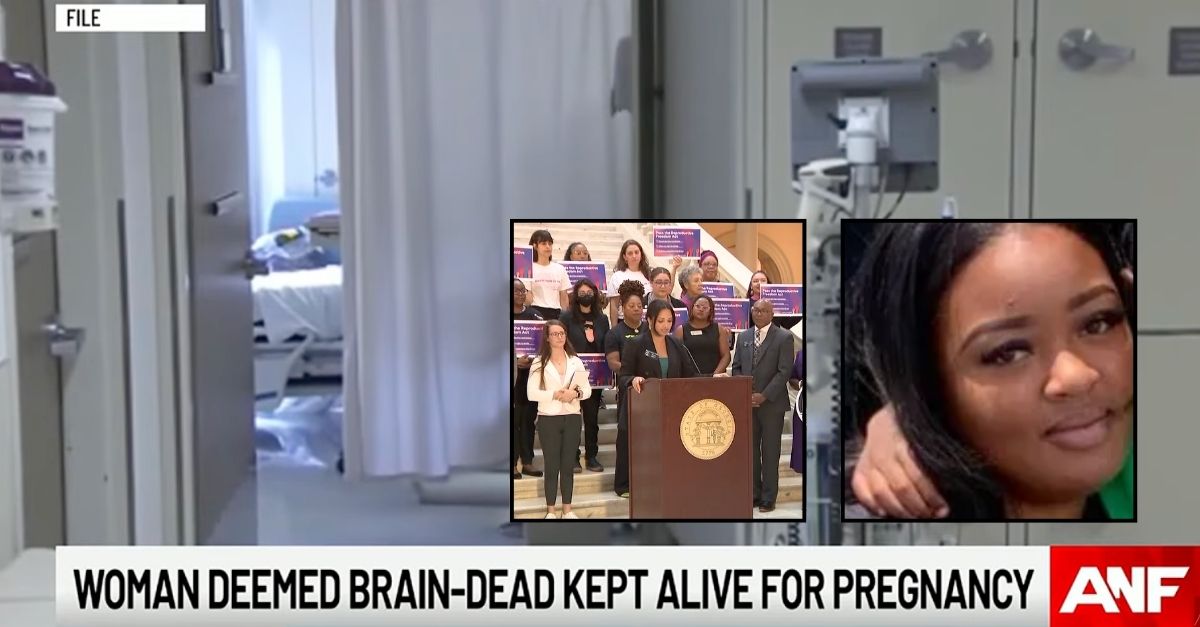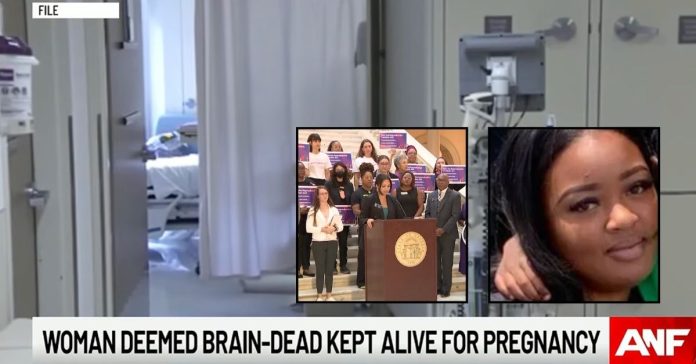
Left inset: Georgia politicians call on Gov. Brian Kemp to clarify what’s going on with Adriana Smith’s hospital and pregnancy case at a press conference on Thursday, May 29, 2025 (WXIA/YouTube). Right inset: Adriana Smith (GoFundMe). Background: Footage captured inside a hospital (WANF/YouTube).
Georgia lawmakers want clarification from Gov. Brian Kemp on the state’s “heartbeat” abortion law — declaring the need for “an official legal opinion” from his attorney general — after the AG’s office insisted the law was not keeping a brain-dead pregnant woman alive until her fetus can be delivered, which her family says is happening, citing explanations from doctors.
“What’s happening right now in a hospital room at Emory Healthcare should shake every single one of us to our core,” said state Sen. Nabilah Islam Parkes at a Thursday morning press conference broadcast by local Fox affiliate WAGA. Senate Minority Leader Harold Jones II and state Rep. Park Cannon joined Islam Parkes, along with public advocates.
“These are not small contradictions,” Islam Parkes said about what’s being reported by the state and doctors in Adriana Smith’s pregnancy case. “These are life and death contradictions, and that’s why I’ve sent a formal letter to Gov. Kemp asking him to do what only he can: request a binding legal opinion from the AG that brings clarity to this crisis.”
The mother of Smith, 30, says Emory University doctors in Atlanta have told them the pregnant mother is on life support because of the LIFE Act, which they have condemned as “torture.” Supporters of the law have pushed back on the claim, saying Smith’s case is unique on account of abortion not being involved and her health crisis.
“There is nothing in the LIFE Act that requires medical professionals to keep a woman on life support after brain death,” Georgia AG Chris Carr’s office said in a public statement Friday, according to local NBC affiliate WXIA. “Removing life support is not an action ‘with the purpose to terminate a pregnancy,’” the statement said, quoting the local state law.
Islam Parkes said Thursday that she is asking the governor and Carr to answer four “basic but urgent” questions that hospitals, doctors and “families across Georgia” need answers to under Georgia law. They include whether a hospital is legally required to maintain a brain-dead pregnant woman on life support in order to continue gestation of the fetus; what the precise definitions are that constitute a medical emergency under the law; what the conditions are specifically for meeting the law’s “threshold” for when it allows abortion in cases where the fetus is incompatible with life; and how the law affects the “legal standing of advanced directives and end of life planning” for pregnant Georgians.
“These questions are not theoretical,” Islam Parkes said. “They’re urgent because as long as this law remains vague, we will continue to see families traumatized, providers criminalized, and patients left behind.”
Smith’s mother, April Newkirk, spoke to WXIA earlier this month and said that when her daughter was nearly nine weeks pregnant in February, she began experiencing severe headaches and went to the hospital. Hospital staff sent Smith home with medication — no CT scan, no further observation, Newkirk said.
The next morning, Smith’s boyfriend woke to find her gasping for air and gurgling, and he called 911. When she arrived at the hospital, a CT scan allegedly revealed several blood clots in her brain.
Newkirk told WXIA that if her daughter had received a CT scan or been admitted to the hospital when she first went in, “they would have caught it. It could have been prevented.”
Doctors asked for Newkirk’s permission to perform a procedure to relieve pressure on her brain, and she granted it. “Then they called me back and said they couldn’t do it,” Newkirk told WXIA.
Smith was declared brain-dead, with no hope of recovery. However, because she was almost nine weeks pregnant, Newkirk said the doctors told her Georgia’s so-called “heartbeat law” forbids the medical termination of her pregnancy since a fetal heartbeat was detected, which is required under the law. And because Smith is no longer seen as being at risk because of her lack of brain activity, she is being forced to stay on life support until her fetus is considered viable, possibly until 32 weeks of gestation. Smith is nearly 23 weeks pregnant as of this writing.

